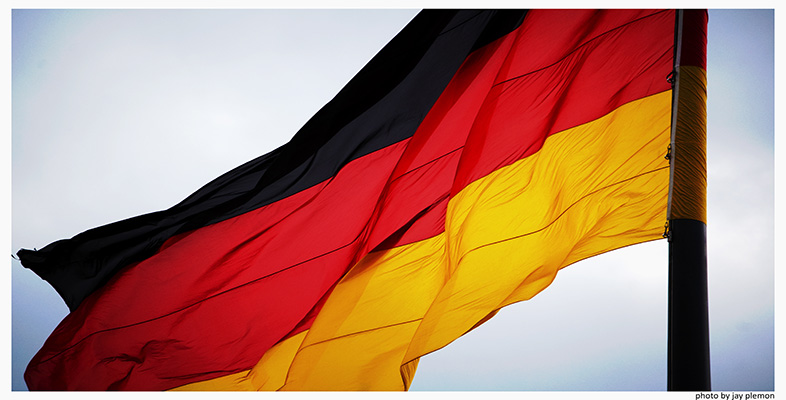2.2 Useful expressions
Here are some useful expressions for you to understand when reading about the German language.
- Vokabeln
Deutsch German
Hochdeutsch standard German
Deutsche Germans
Land, länder country, countries
Staat, staaten state, states
Sprache language
Muttersprache mother tongue
Minderheitensprache minority language
Landessprache national language
offizielle Sprache official language
sprechen, spricht speak, speaks
Übung 10
Look at the extracts below to learn more about places where German is spoken. You will probably not understand all of it yet, but keep a look out for the countries mentioned in each paragraph. You may like to make some notes.
Bitte markieren Sie.

Discussion
Translating some sentences, these are the countries mentioned in each text.
Germany, (the German part of) Switzerland, Austria, Luxembourg, Liechtenstein
more than 60 countries where German is a minority language
Germany, Austria, Denmark, Italy, France
Germany, Namibia
Poland, Russia, Romania
places in the USA, Canada, (Southern) Brazil
Australia
Übung 11
Now go through the extracts again. Even without understanding much German, can you guess what kind of information is given in each of them? Read the English summaries below and decide which one represents each of the German extracts.
Bitte ordnen Sie zu.
Using the following two lists, match each numbered item with the correct letter.
Extract 1
Extract 2
Extract 5
Extract 6
Extract 7
Extract 4
Extract 3
a.Germans also went overseas. For example, you can find a large number of Mennonites in both North and South America.
b.Germany used to have some colonies, where German is still spoken today.
c.German emigration to Australia concentrated in the Barossa Valley, a famous wine-growing area which attracts many tourists.
d.Many Germans left their home, for example for religious reasons, and went to live in Eastern Europe.
e.German is also spoken by some of the people who live in regions that share a border with Germany.
f.German is the national language in a number of European countries.
g.There are also countries all over the world where German is spoken as a minority language.
- 1 = f
- 2 = g
- 3 = d
- 4 = a
- 5 = c
- 6 = b
- 7 = e
Discussion
If you found the correct English extracts for some or all of the texts, you will have understood the most important information given. When reading in a foreign language it's important not to be scared by the number of new words and structures that are being used, but to concentrate on what you can understand.
Übung 12
The following audio clip contains five short dialogues in which people talk about their origins. Listen and read the sentences below. They each contain one error. Rewrite the sentences correctly.
Hören Sie und korrigieren Sie die Sätze.
- Vokabeln
- Herr Mr
- Frau Mrs, Miss, Ms
- meine Familie my family
- meine Mutter my mother
Transcript: Übung 12
Dialog 1
Dialog 2
Dialog 3
Dialog 4
Dialog 5
1. Marcos Schneider kommt aus Deutschland.
2(a). Frau Lahn kommt aus Hahndorf. Das ist in Namibia.
2(b). Frau Lahns Familie kommt aus Österreich.
3. Frau Lengenfelder kommt aus der Schweiz.
4. Herr Söder kommt aus Norddeutschland.
5. Frau Schweigert kommt aus Kanada.
Answer
Here are the corrected versions of the sentences:
1. Marcos Schneider kommt aus Brasilien.
2(a). Frau Lahn kommt aus Hahndorf. Das ist in Australien.
2(b). Frau Lahns Familie kommt aus Deutschland.
3. Frau Lengenfelder kommt aus Russland.
4. Herr Söder kommt aus Dänemark.
5. Frau Schweigert kommt aus Kasachstan.
In the dialogues the question word woher was used several times. It means ‘where from’.
